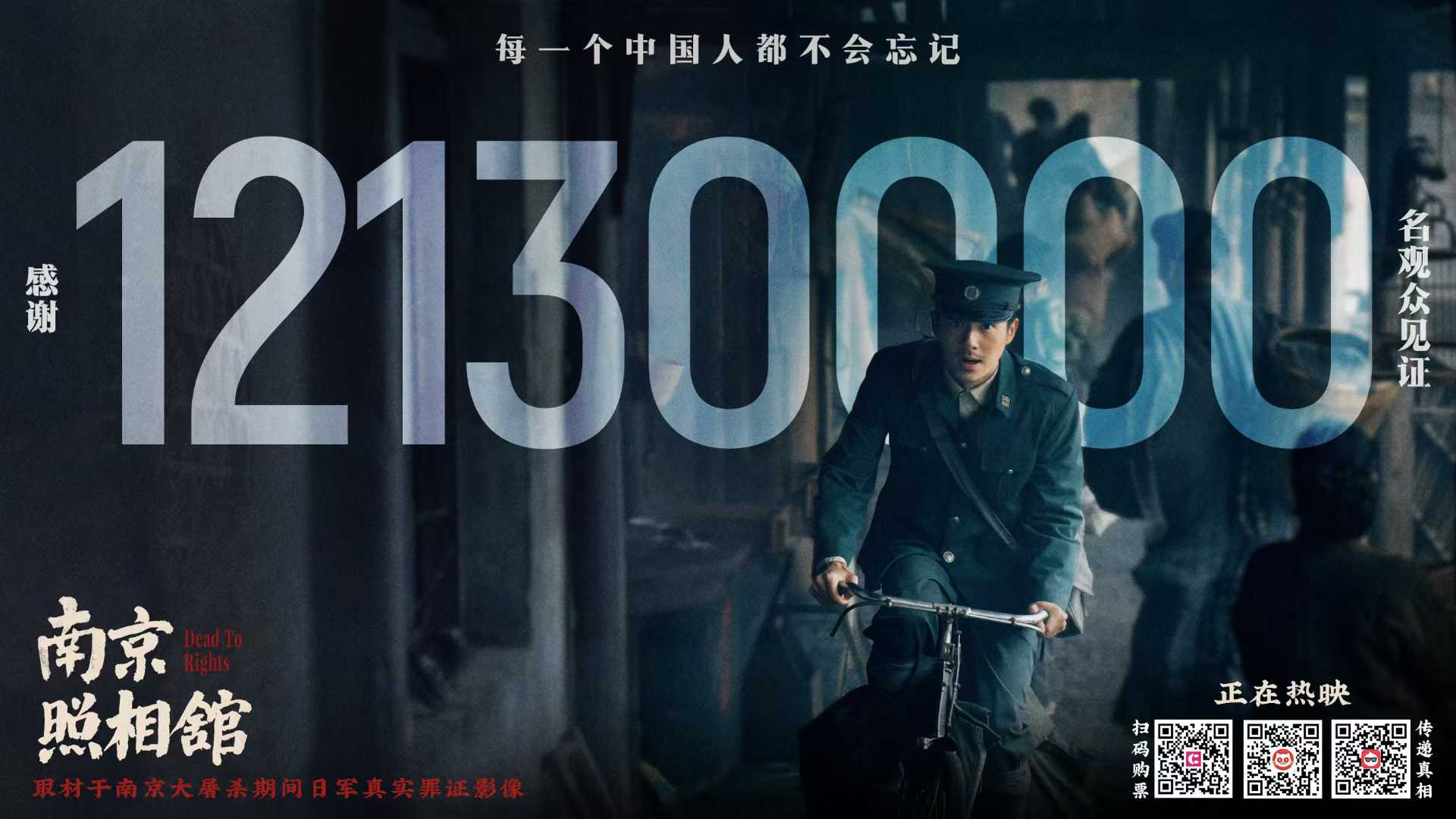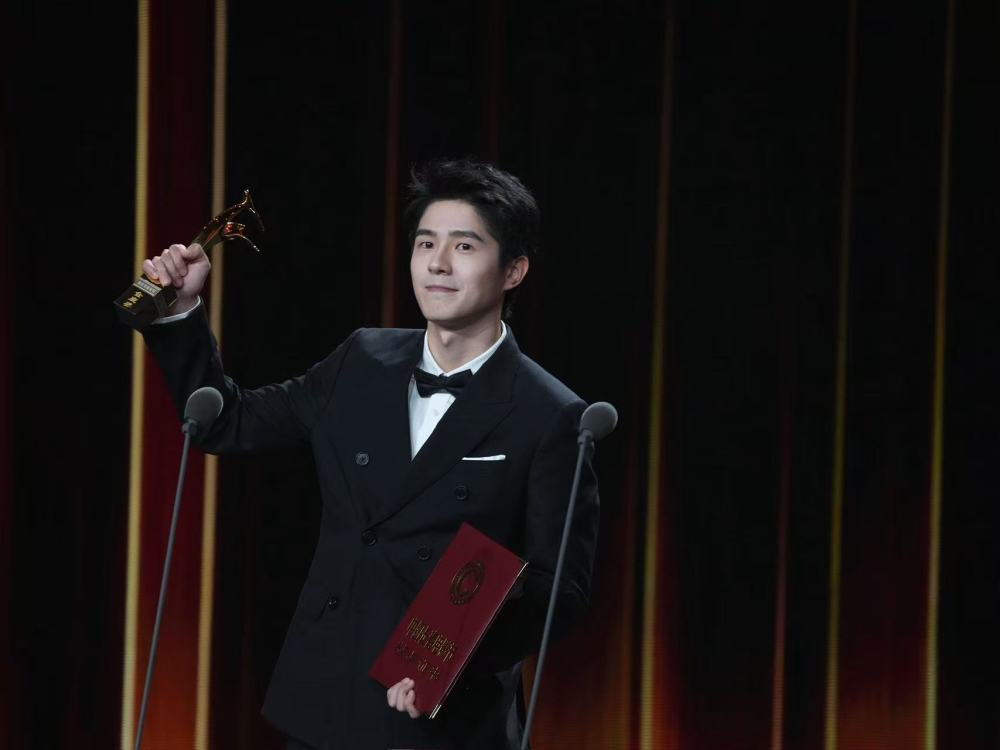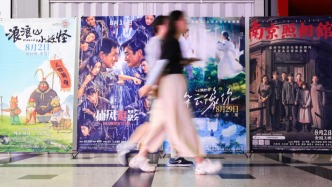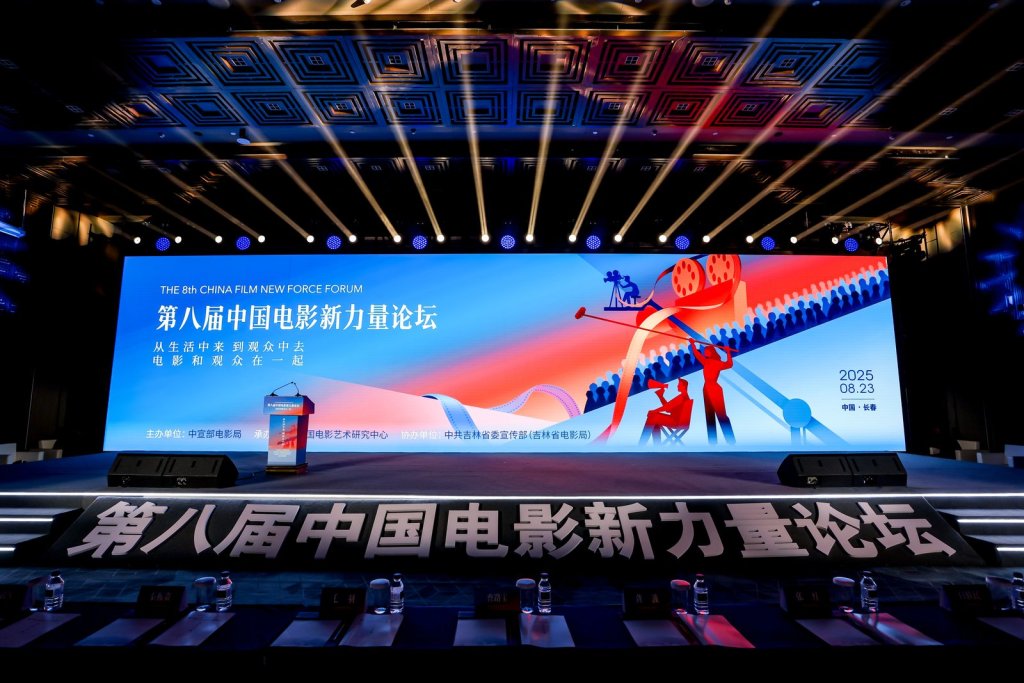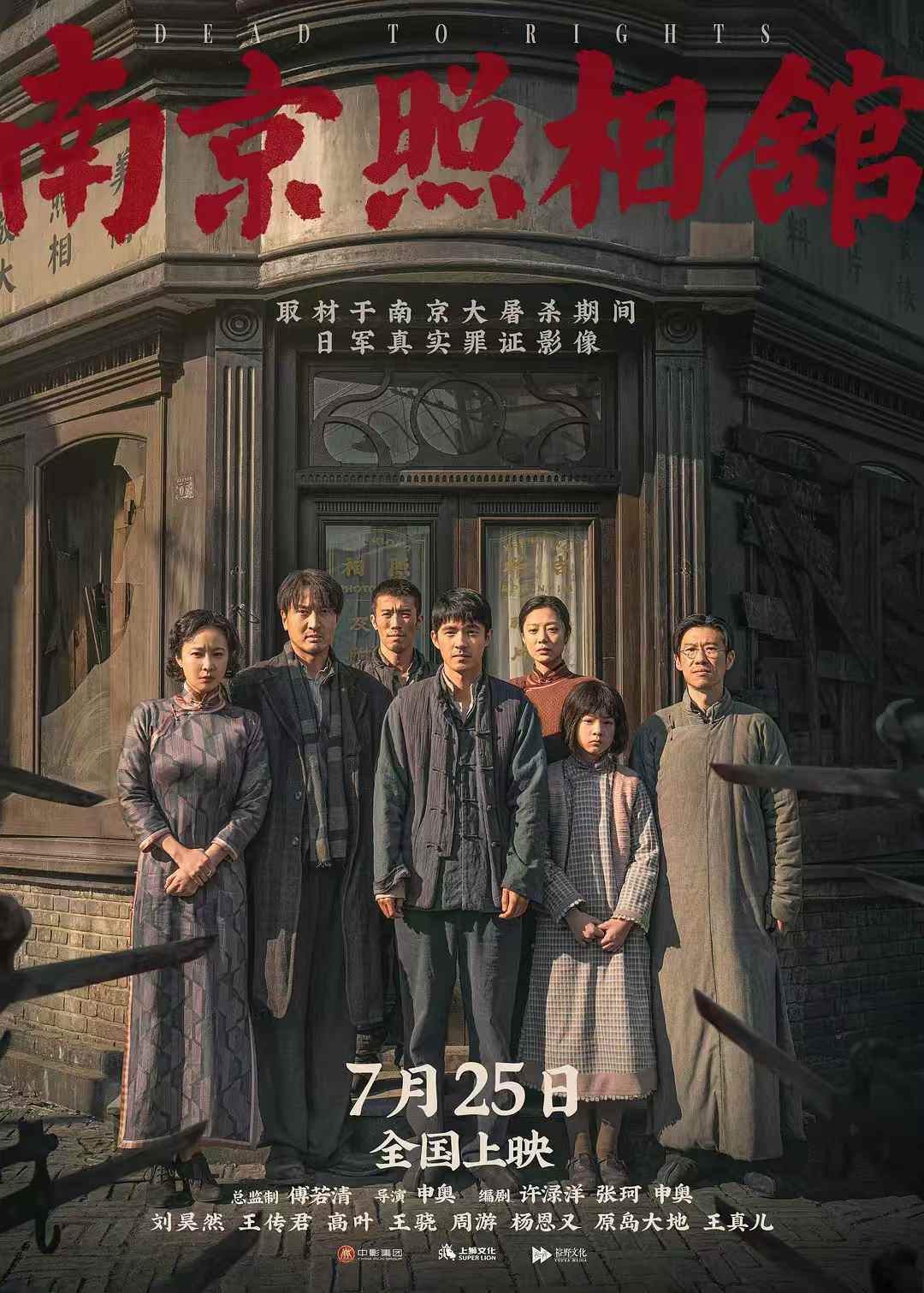
The real "hit" of the summer season has arrived. Since its release on July 25, the movie "Nanjing Photo Studio" has grossed over 460 million yuan, and the single-day box office on July 27 exceeded 300 million yuan. Relevant institutions have raised their forecasts for the total box office of the film to over 3 billion yuan. On social networks, many topics about the film are fermenting, continuously increasing the popularity and attention of the film.
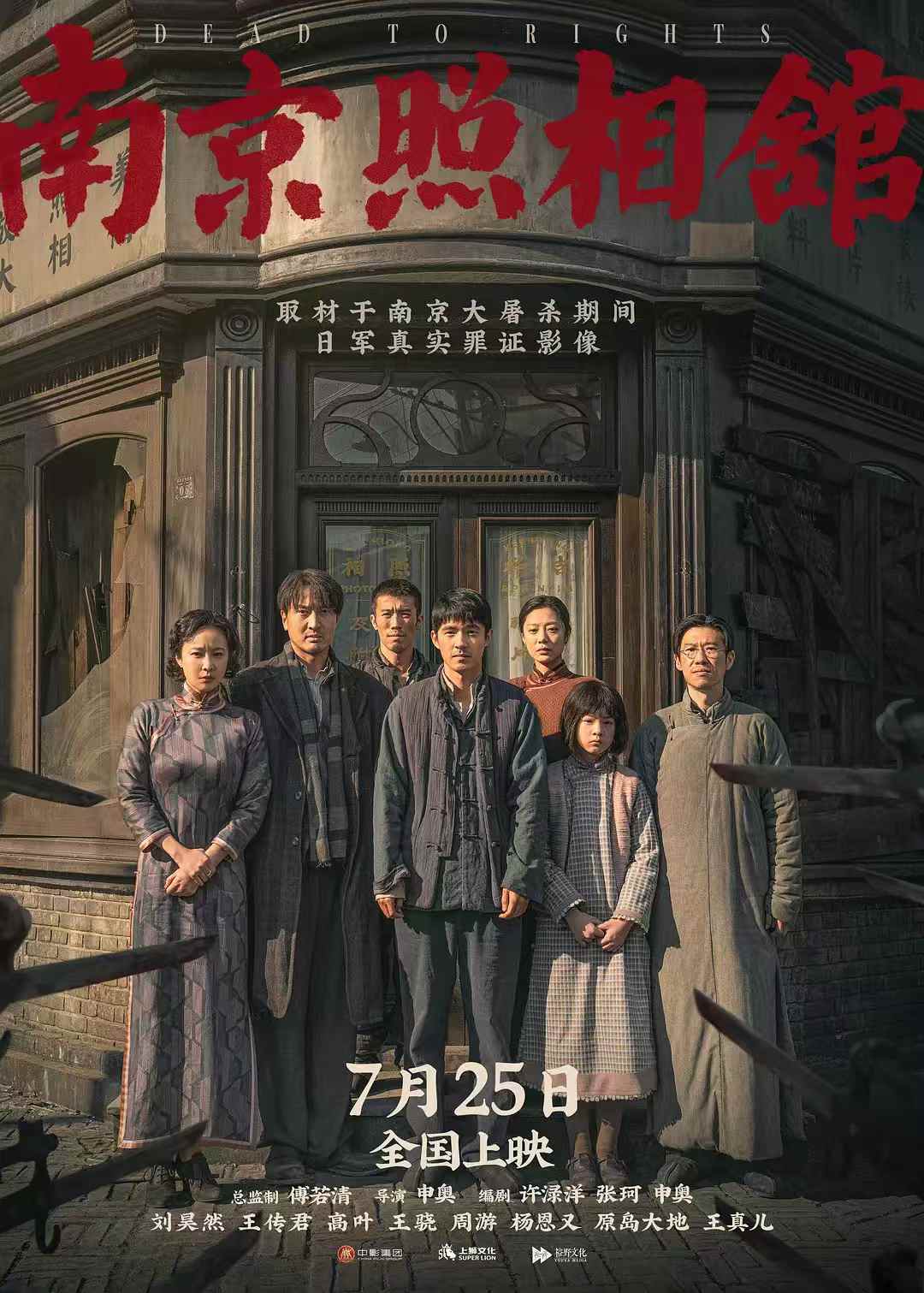
"Nanjing Photo Studio" is now showing nationwide
The film "Nanjing Photo Studio" is based on a painful historical background and finds an extremely clever narrative incision in the historical gap: On December 13, 1937, the Japanese army captured Nanjing. Seven strangers in the city met in a photo studio in the city in order to live as much as possible. In the process of being forced to help the Japanese photographer develop the film, they found photos that could prove the Japanese army's massacre. It reveals the memory that must not be forgotten from a unique perspective.
On July 28, the film's director Shen Ao and starring actors Liu Haoran, Gao Ye and Yang Enyou came to Shanghai for a roadshow. During the interview, they shared many profound insights on the film's creative concept and detailed design.
The historical evidence is irrefutable; there is no need to sell violence and bloodshed.
The Chinese title of the film is "Nanjing Photo Studio", but the English title is not translated directly, but more pointedly translated as "Dead to Rights". Regarding this detail, Shen Ao explained: "On the one hand, it has the meaning of ironclad evidence, which fits the theme of the film; on the other hand, it conveys the emotion of living in the face of death and unswerving determination, which is also the spiritual connotation we want to express through the film."

Director's bid
my country has made many films about the War of Resistance Against Japanese Aggression, with Nanjing as the background. There are also "Nanjing! Nanjing" and "The Flowers of War" and other films that different directors choose different perspectives to cut in. Talking about the reason for choosing the "photo studio" as the core scene of the film, Shen Ao revealed that he was inspired by "The Blood Evidence of the Massacre" produced by Nanjing Film Studio in 1987, and after obtaining the adaptation copyright, he made innovations in the new era. At the same time, director Shen Ao himself has been a film photographer since he was a child. He developed photos under the guidance of his father and is full of affection for film. "During the war, the photo studio, a place that should have preserved happy moments, was filled with the crimes of the Japanese army and the truth that needed to be exposed. The red lights in the darkroom were like blood. This strong contrast gave me creative inspiration. I want to use photos as a powerful weapon in propaganda and public opinion warfare, and dig deep into this element."
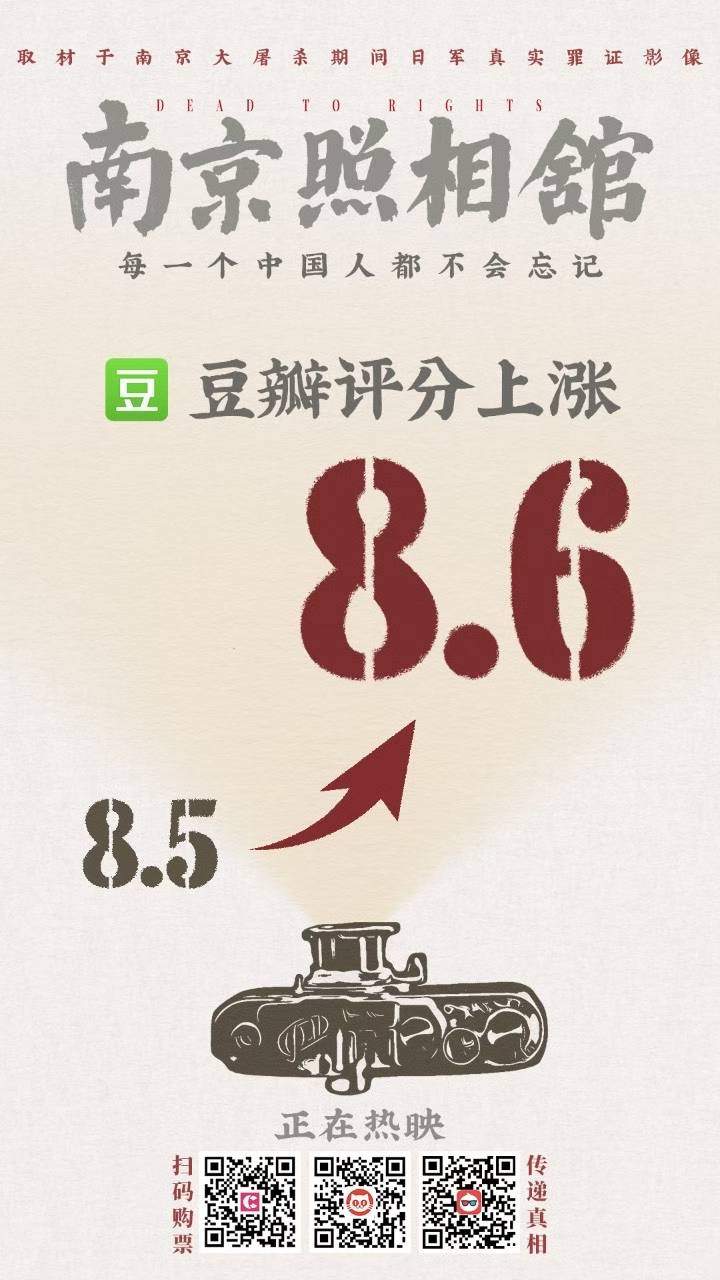
The movie was released for 3 days and the Douban score rose
The diverse dialects of the characters in the film are ingenious. Wang Xiao and Zhou You are both actors from Nanjing and can speak authentic Nanjing dialect. At the same time, the film also takes into account other accents from all over the world. Shen Ao said: "As the capital at the time, Nanjing was a city that was inclusive of all parties. So when selecting actors, I hoped to gather people from different regions and let them perform in the language they are best at. This time, I chose actors from Jiangsu, Shanghai and the north in the hope of showing an inclusive Nanjing, so that everyone knows that Nanjing is not only the Nanjing of Nanjing people, but also the Nanjing of all Chinese people."
Compared to traditional war films, Nanjing Studio does not deliberately exaggerate the blood and violence of war. The film does not give positive shots to civilians who are killed or women who are violated. In addition to the war scenes, the shots of Shen Ao focus more on ordinary individuals who are struggling to survive in the war. On one hand, they are being slaughtered, on the other hand, they try to survive, and in the process of watching over each other, the brilliance of humanity bursts out.
When creating the film, Shen Ao paid special attention to the balance between cruelty and tenderness. He clearly pointed out: "Regarding this war and the atrocities of the invaders, our history textbooks and other film and television works have shown it many times. All Chinese people are familiar with this period of history and are heartbroken." Therefore, in this creation, Shen Ao adhered to "not directly focusing the camera on atrocities and blood, and did not want these elements to become a gimmick to sell a movie. We hope to let the audience see the glimmer of humanity that ordinary people, simple working people can bloom under the background of war, and use the little light of the photo studio to illuminate the hearts of all the people in Nanjing, and at the same time ignite the truth."
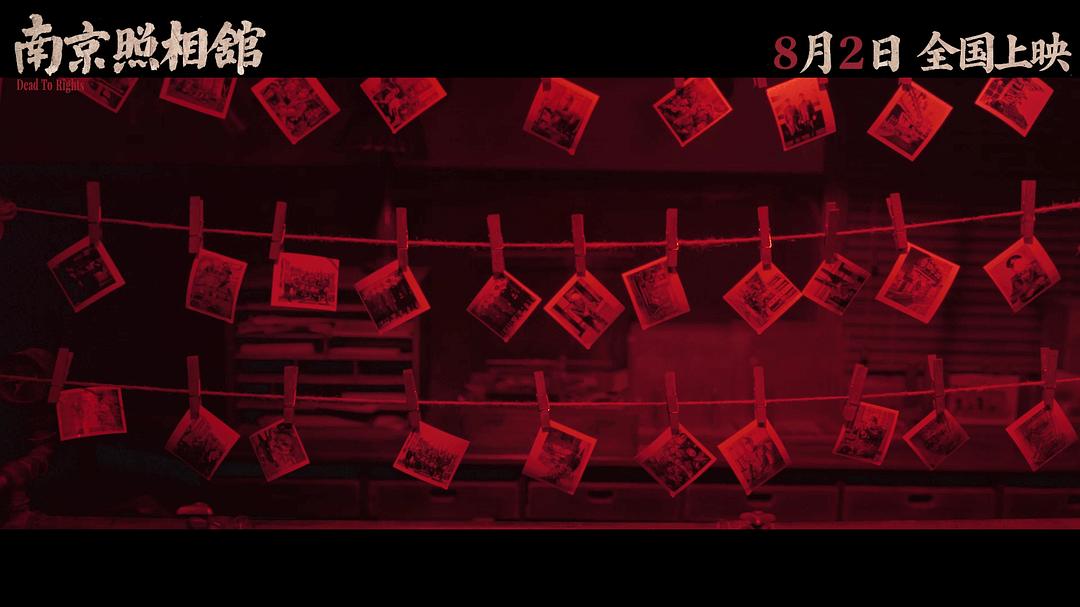
Photos that reveal the truth
It is worth mentioning that the recent road show of "Nanjing Photo Studio" is also a thoughtful "revisiting the road of the Anti-Japanese War". Along the way, Shen Ao also had a lot of feelings, "In fact, the entire Nanjing Massacre did not only happen in Nanjing, but all the way from Shanghai to Nanjing, including Suzhou, Changzhou and other cities in between were massacred."
During the roadshow, seeing the prosperity of cities such as Shenyang, Dalian and Shanghai that were once devastated by war, he said with emotion: "The cities that were trampled by the Japanese army have now blossomed into a modern and prosperous city. This change is really very exciting." Shen Ao said that making the motherland strong is the best response to that humiliating history.
“Actors are the developers of the times”
In "Nanjing Photo Studio", Liu Haoran plays Su Liuchang, a postman pretending to be an apprentice in a photo studio. The apprentice who was impersonated is named Chen Yongtai. "Achang" and "Atai" represent prosperity and peace. "Each character's name carries the background and beautiful meaning when the script is written." Liu Haoran also mentioned another interpretation of the audience that impressed him. The two people who escaped from the photo studio at the end, one surnamed Jin and the other surnamed Lin, are homophones of "Jinling", "which means that it is our people who stand up from this land and live on." In his opinion, the hope hidden in these names is the deep connotation that the director gave to the characters in the early stage of creation.
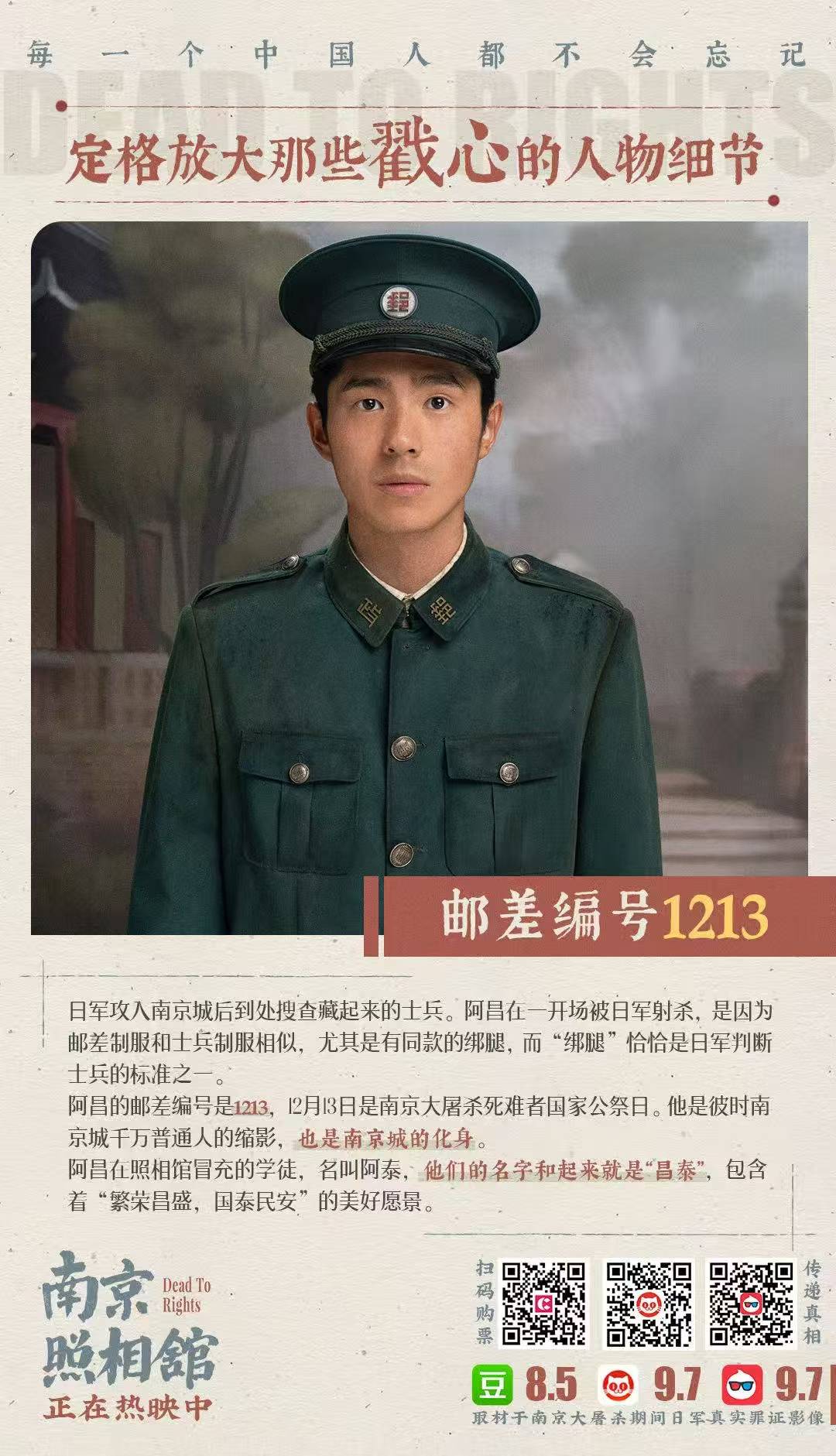
Details of Achang
Liu Haoran talked about his habit of walking around the local area when filming. When he was filming in Northeast China, he had a deep feeling for history. "When I was filming in Northeast China, whether it was Shenyang, Jilin or Anshan, I would always visit the local martyrs' cemetery. Those places that had suffered hardships and massacres, the martyrs' cemetery is an important carrier of historical memory."
After the film was released, he saw many history and military bloggers’ deductions on the direction of the war and historical science popularization on the Internet, which made him feel the power of historical inheritance. What impressed Liu Haoran was that "there are many young children who have not been exposed to this period of history and are learning about it. This is a kind of historical handover." He believes that from the ancestors who experienced the war, to the parents, to the young people of his generation, the understanding of "what China has experienced" and "why China can become prosperous and strong" has been continuously deepened. "This is also what our actors, directors, and those history science bloggers have been doing."
On July 17, Liu Haoran wrote in an article for People's Daily that "actors are the developers of the times." He further explained this in conjunction with the film. "Development is an essential process for turning film into photos. It requires precision and the control of time and dosage." He believes that the work of actors is similar to this. "We must use the best state and the most accurate performance to turn text works from scripts into dynamic images on the screen and pass them on to audiences of all ages." The nature of this work happens to echo the subject matter of Nanjing Photo Studio, which gave him a deeper understanding of the responsibilities of actors.

Liu Haoran and Gao Ye talk about their roles
In the movie "Nanjing Photo Studio", Lin Yuxiu, played by Gao Ye, is the epitome of countless ordinary women in that turbulent era. Her tenacity and emotion are vividly displayed in the film.
Gao Ye admitted that she almost forgot she was acting, "I just felt like I was Lin Yuxiu". Especially when filming the separation scenes, she couldn't help shouting "Let's go together, let's go together". "Especially the scene where A Jin, Lao Jin and A Chang were talking about their master, I was actually very painful at the time. I shouted "Let's go together", although I knew that was impossible to achieve, but I still wanted to say this seemingly illusory hope." The director finally kept the phrase "Let's go together" in the film, which made her very grateful. This is not only the voice of the character, but also her empathy with the simple wishes of people in that era.

Gao Ye as Lin Yuxiu
Gao Ye has many crying scenes in the film, with trembling and depression, despair and fear. When talking about the handling of several crying scenes, she said, "As an actor, crying is the least worth mentioning thing." She hopes to convey to the audience the complex emotions contained in the character's eyes besides tears, "because at that moment all the emotions are rising and surging, maybe timid, maybe dying, maybe desperate." Gao Ye believes that the audience can empathize with the character because they understand these deep emotions.
Recently, as she traveled through cities on the film tour, she was most moved by the prosperity full of fireworks: "People say that our film has no Easter eggs, but in fact, after watching the film, the audience walked out of the theater and saw the prosperous China today. This is the 'easter egg' of this film. It is a group of simple, tenacious and hardworking Chinese people who created such a new China. They not only created a prosperous city, they created a miracle."
The movie has been made, we can wait until the children grow up
After the release of the movie "Nanjing Photo Studio", it quickly attracted widespread attention. On the one hand, the film has won a lot of praise from the audience for its profound historical perspective, delicate character portrayal and sincere emotional expression, and has become a recent work with strong reputation; on the other hand, because the subject matter involves the heavy history of the Nanjing Massacre, many parents are entangled, worried that the content of the film is too depressing, and unsure whether to take their children to the theater. On social networks, comments such as "Is it suitable for children to watch?" and "I want to take my children to receive patriotic education, but I'm afraid it's too bloody" are not uncommon.
In response to such concerns, the main creators gave a rational and warm response in a group interview. Liu Haoran mentioned in his sharing: "During the filming process, the director tried to restrain himself and did not allow too many bloody scenes to appear. After the release, I saw grandparents in their 80s and elementary school children coming to the theater. I was very moved. The brave Chinese audience is sensitive and they can feel the power conveyed by the film."
Gao Ye quoted a sentence that director Shen Ao said in a previous roadshow: "Many children who are too young may not be suitable to watch such a movie, but it doesn't matter, the movie has been filmed, the movie is there, and the movie can wait for them to grow up."
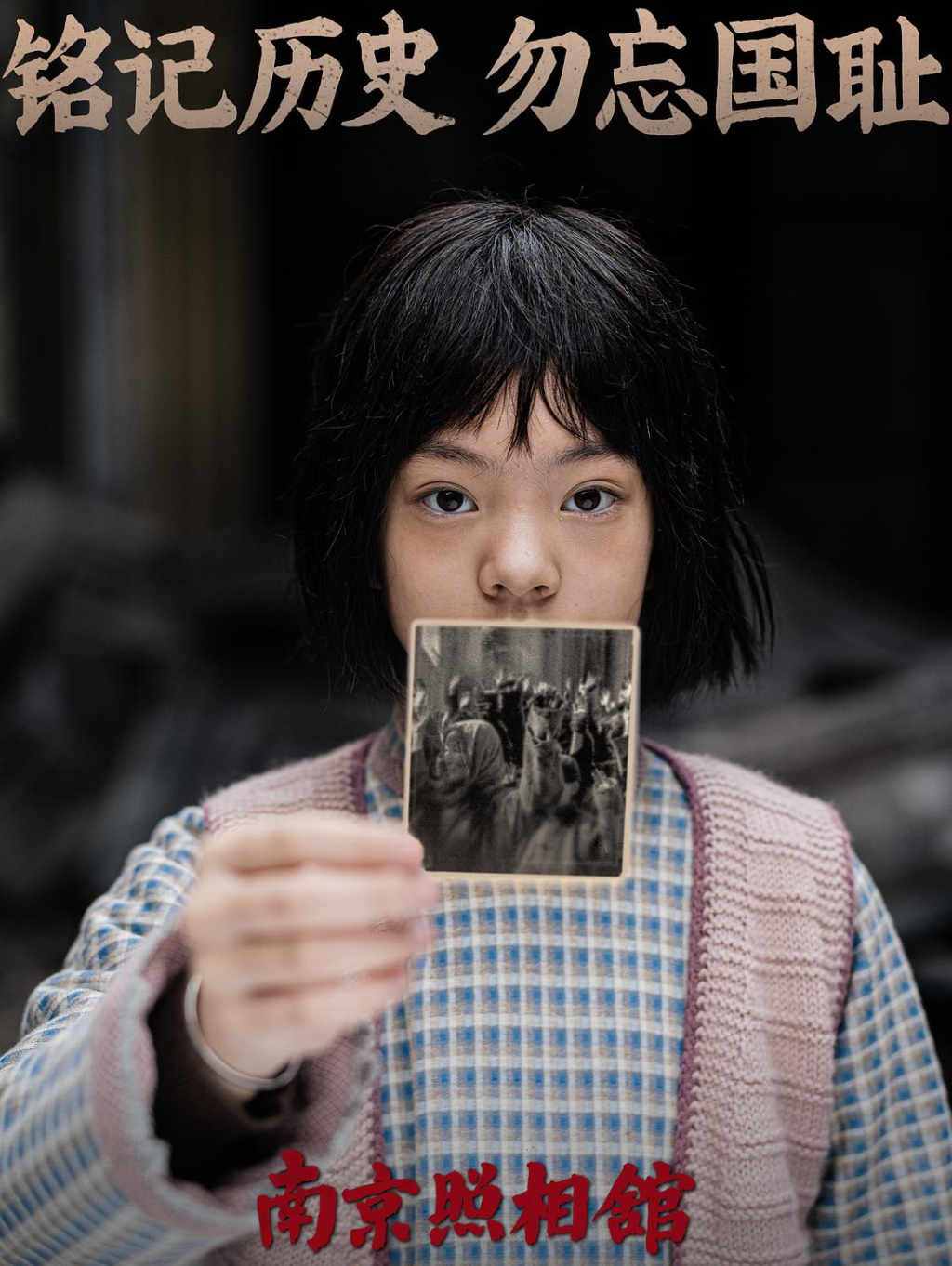
Yang En
In the film, Yang En, the young actress who plays the role of Lao Jin's daughter, tells the story of "Nanjing Photo Studio" from a child's perspective. "Wanyi is actually a very smart child. She knows there is a war, but she has been hiding in the cellar of the photo studio with her family and has never gone out, so she doesn't know what war is like."
There is a scene in the film where a family portrait is taken. The original design of the director was that all the actors would cry while taking this final photo. The 12-year-old Yang En took the initiative to put forward her own ideas to the director - she felt that Wanyi had never seen Japanese people, and would think that her father was playing a game with her, so she shouldn't cry. This thinking based on the character's situation was eventually adopted by the director, making this scene present a more complex emotional level - in the grief and despair of adults, the innocence of children becomes a special power, contrasting the destruction of the beautiful daily life by war.
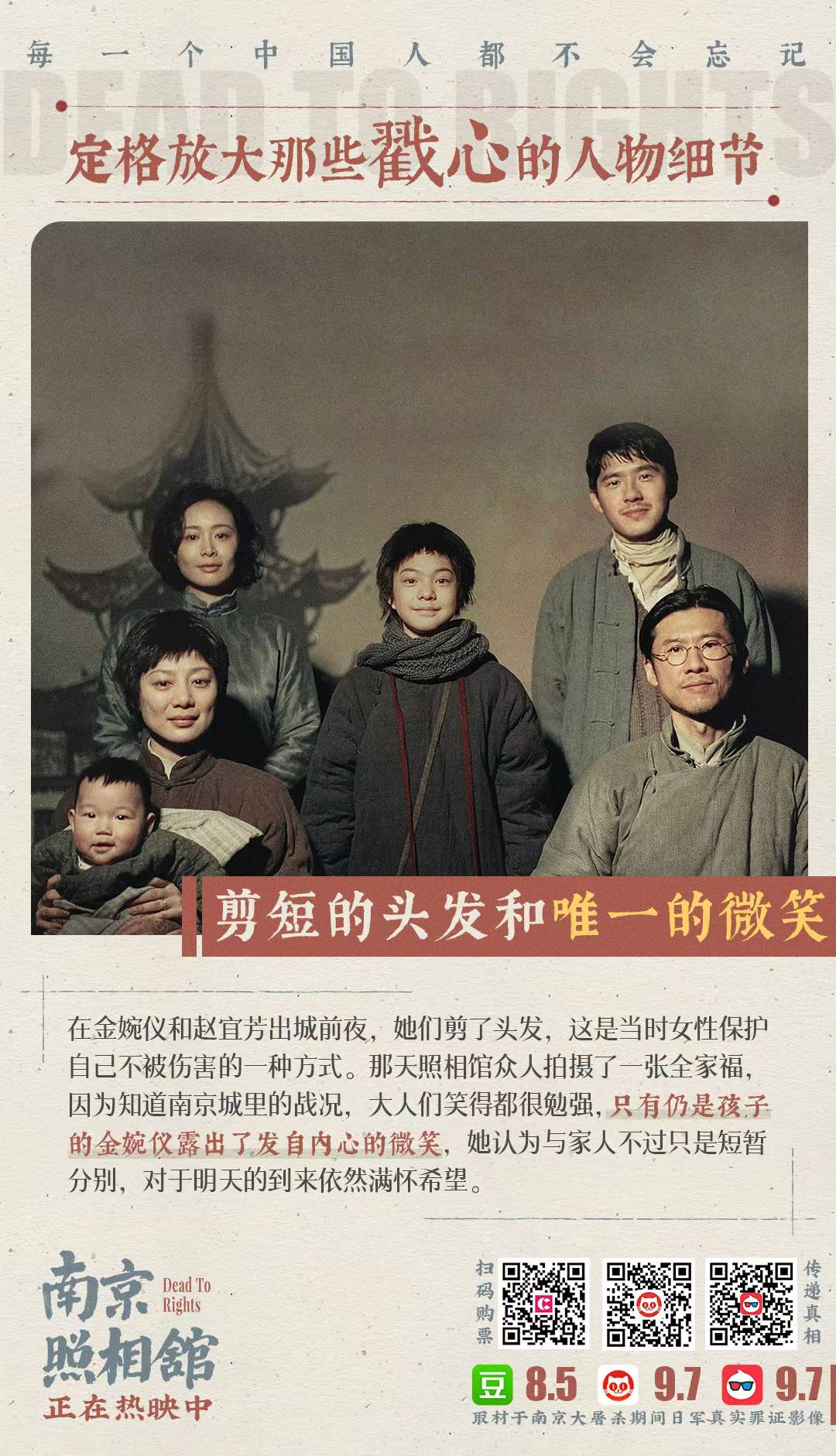
Family portrait in the film
During the interview, all the creators talked about the impressive reviews after the film was released. Yang En also mentioned that one netizen asked, "Who will go to see this movie?", and the answer that impressed her the most was "Chinese people."
"Every war is a tragedy for all mankind. In making this film, in addition to making the audience feel extremely sad and angry, more importantly, we hope to inspire a force in the hearts of the audience. We hope that the audience can turn their grief and anger into strength, and to inspire them to have the courage to build a more prosperous motherland." Shen Ao said.
